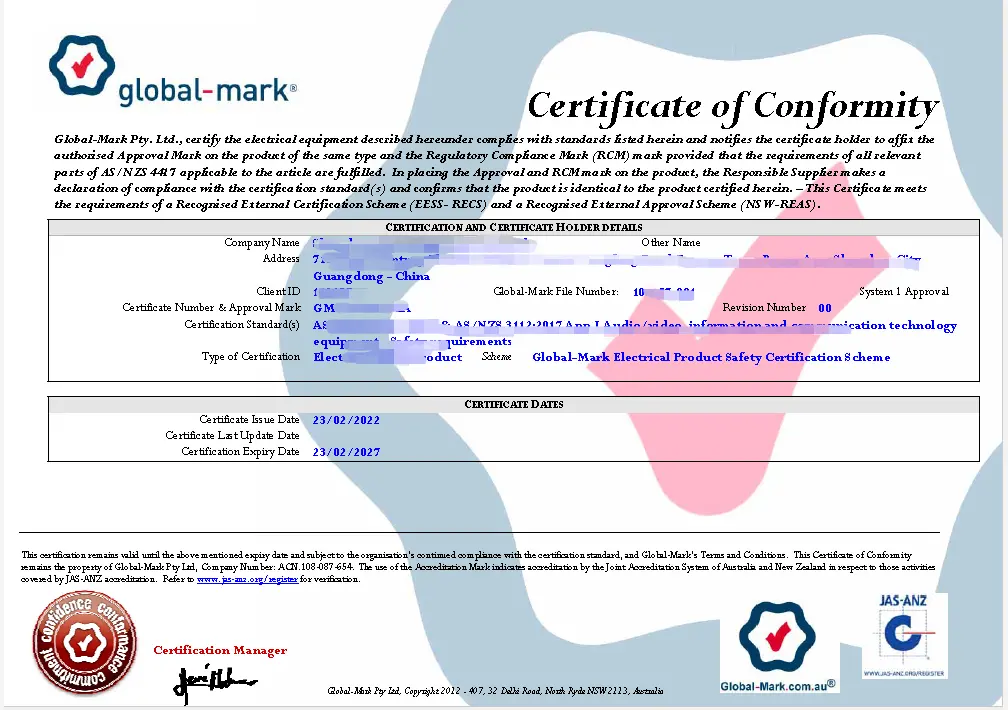
What is Australian SAA certification?
saa certification is accREDited by the Standards Association of Australia (saa), so many friends refer to it as Australian Certification. Products listed on the mandatory list for entry into Australia (including Australia and New Zealand) must pass this certification and have the certification certificate number stamped on them to legally enter the Australian market. Australia and New Zealand have a bilateral agreement on standard mutual recognition, so all products certified by SAA can smoothly enter the New Zealand market for sale.
Types of SAA Certification:
There are two types of SAA certification: mandatory and voluntary.
Application Methods:
One method is to use a cb certificate + report (CB must have Australian deviations), and the other is to use an IEC standard report + Australian deviation transfer.
Scope of SAA Certification:
There are approximately 62 categories for mandatory certification, such as external power supplies or chargers, wires, plugs, and some household appliances. RegULated electrical appliances must obtain a certification issued by the monitoring department, namely SAA certification, and must comply with regulations (must have the certificate number stamped).
Mandatory Certification List for Electrical Products in Australia and New Zealand:
1. Electrical connectors
2. Arc welding machines
3. Bayonet lamp holder
4. Bayonet lamp holder adapter
5. Carpets
6. Toasters
7. Clothes dryers
8. Control devices or regulating devices
9. Kitchenware - portable
10. Extension cord socket
11. Line switches
12. Decorative lighting equipment
13. Dishwashers
14. Threaded lamp holder
15. Electric fans
16. Circuit boosters
17. Electric blankets
18. Floor waxing machines/washers
19. Fluorescent lamp ballasts
20. Fluorescent lamp starters
21. Hair care appliances
22. Hedge trimmers
23. Immersion heaters
24. Insect killers
25. Hand lamps
26. Electric irons
27. Kitchen appliances
28. Lawn care equipment
29. Liquid heating appliances
30. Portable lamps
31. Searchlights
32. Massagers
33. MICrowave ovens
34. Miniature circuit breakers
35. Plugs
36. Sockets
37. Power chargers
38. LED modules
39. Projectors
40. Stoves
41. Range hoods
42. Shavers/hair clippers
43. Refrigerators/freezers
44. Residual current devices
45. Room heaters
46. Sewing machines
47. Soldering irons
48. Power cords
49. Swimming pool or spa equipment
50. Television receivers
51. Therapeutic lamps
52. Electric drills
53. Sanders or polishers
54. Circular saws
55. Planers
56. Grinders
57. Chainsaws
58. Vacuum cleaners
59. Wall switches
60. Washing machines
61. Waterbed heaters
62. Water heaters
Non-mandatory products refer to products outside of mandatory certification, such as commercial kitchen utensils. Although non-regulated products are not required to obtain certification, the safety is the responsibility of the seller/manufacturer, and certification can be voluntarily applied for.
SAA Application Process:
1. Fill out the application form (provide certification-required information).
2. Submit product samples for testing.
3. Rectify the product (if testing fails).
4. Issue a report.
5. Submit the report for official review by Australia.
6. Upon approval, issue the certificate.
Documents Required for SAA Certification:
1. Application form
2. Authorization letter
3. Test report
4. Instruction manual
Application period: 10-15 working days
saa certificate Template:

JJR's Services:
JJRLAB, as an internationally authoritative comprehensive testing and certification service provider, can provide professional australian saa certification services to help clients efficiently obtain SAA certificates and ensure the smooth export of their products to Australia!
Email:hello@jjrlab.com
Write your message here and send it to us
 European Toy Safety Standard EN 71-20:2025
European Toy Safety Standard EN 71-20:2025
 EN 18031 Certification for Connected Devices on Am
EN 18031 Certification for Connected Devices on Am
 Compliance Guide for Portable Batteries on Amazon
Compliance Guide for Portable Batteries on Amazon
 2026 EU SVHC Candidate List (253 Substances)
2026 EU SVHC Candidate List (253 Substances)
 LFGB Certification Cost and Timeline Guide
LFGB Certification Cost and Timeline Guide
 Bluetooth FCC Test Report
Bluetooth FCC Test Report
 Is FCC Testing Required?
Is FCC Testing Required?
 Where to Find FCC Test Reports
Where to Find FCC Test Reports
Leave us a message
24-hour online customer service at any time to respond, so that you worry!




